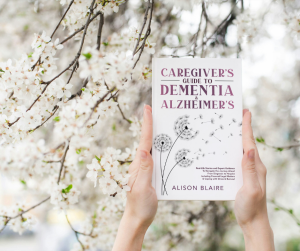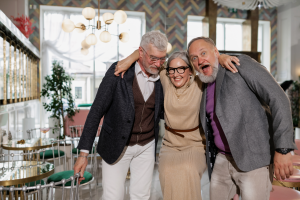
Caregiving is already a mountain. But when you’re climbing it with aching knees, maybe a heart that skips every now and then, and a mind that’s doing its best to stay sharp—it can feel like too much. And yet, here you are, doing it anyway.
If you’re a senior caring for another senior with dementia, you’re not alone. Not by a long shot. In fact, nearly one in five caregivers in the U.S. are over the age of 65. Many of them are spouses. Some are siblings. Others are lifelong friends. They carry this invisible weight that grows heavier by the week, all while managing their own health challenges, appointments, medications, and fatigue.
This post is for you.
It’s not meant to sugarcoat the days you want to cry in the pantry so they can’t hear you. It’s not going to pretend that a green smoothie and some affirmations can undo decades of cognitive decline. What it will do is remind you of the quiet power you already have. And give you a few tools to help carry the load with a little more grace—and a little less isolation.
You’re not broken for feeling overwhelmed
Let’s begin here. You are not weak for feeling tired. You are not selfish for wanting a break. You are not failing for thinking, I don’t know how much longer I can do this.
These thoughts don’t make you a bad caregiver. They make you a human one.
Dementia is relentless. Some days it’s like the person you love is still there, eyes twinkling with recognition, laughter bubbling up in a moment of lucidity. Other days, they look through you like you’re a stranger. It’s like losing them one tiny piece at a time. Grieving them while they’re still breathing.
And if you’re aging too, you don’t get to push pause on your own needs. Your joints hurt. You’re dealing with memory lapses of your own. Maybe you’re worried about what happens if you forget where you put the stove knob next time.
The exhaustion you feel? It’s valid. But there are ways to keep showing up—without burning out.
Rebuild your energy in ways that fit your life now
You don’t need a personal trainer or a $500 yoga retreat. You just need small, gentle anchors that can pull you back to yourself in the chaos.
Try this:
- Five minutes of stillness before they wake up. Just you and your breath.
- A soft morning stretch before the day asks too much.
- A support call with a friend or caregiver group once a week, even if it’s short.
- Light movement that feels doable—walking laps inside the house, stretching while watching TV, or following a seated exercise video.
Holistic caregiving means you are part of the care plan too. Sleep, food, joy, and movement aren’t luxuries. They’re lifelines.
Accept help, even when it’s hard
Many older caregivers grew up with a mindset of doing things yourself. Independence was the goal. Pride was stitched into your bones.
But dementia caregiving isn’t something one person can do alone for a long stretch and that too all by themselves and not experience the sheer toll on their their health, their peace, or both.
If someone offers to help, let them. If they don’t, ask. It can feel uncomfortable at first. You might wonder if they really want to, or if you’re being a burden. But caregiving is a marathon, and even marathon runners take water breaks handed out by strangers.
You are allowed to accept help. You are allowed to need it.
Start with:
- Adult day care programs in your area
- In-home respite care (even if it’s just once a week)
- Meal delivery services
- Transportation support for appointments or errands
- Family calendars that let others sign up for regular check-ins or visits
No, it’s not always simple to coordinate. But a few hours off your feet can refill a drained tank in ways that ripple through your week.
Prepare for moments of joy. They still exist.
This one surprises a lot of people. But yes, even in the hardest weeks—joy shows up. A shared laugh over a silly memory. A favorite song that lights up their eyes. The way they suddenly reach for your hand, unprompted, and hold it like they used to.
Don’t feel guilty when those moments happen. Savor them.
They don’t mean the hard stuff isn’t real. They just mean that even in the grip of a disease that steals so much, something human remains. Something soft. Something real. Hold onto that.
And make space for your own joy, too. Read your book. Watch your show. Sit in the sun. Joy doesn’t need to be big. It just needs to be yours.
Plan ahead, but live today
If you’re a senior yourself, you may worry about what happens next. What if your own health declines? What if you can’t do this forever?
These questions deserve answers, and you are strong enough to seek them.
Talk with your doctor. Build an emergency care plan. Discuss options with family or a trusted legal professional. Put things in writing while your mind is clear and your voice is strong. It’s not pessimistic. It’s wise.
But also—don’t forget to live today. One day at a time. One hour at a time if you need to.
Because every hour you show up, despite it all, is a quiet kind of victory. And you deserve to know that.
You’re doing the impossible—and still waking up to do it again.
If you’re a senior caring for someone with dementia, I wrote something that might help. It’s a guide, a companion, a little lifeline when the days feel heavier than your bones can carry.
You can find my book here: Caregiver’s Guide to Dementia & Alzheimer’s

It’s written for people like you—who are showing up every day for someone they love, even when the road ahead is foggy. I see you. You’re not alone.







This post hit me right in the heart. Caregiving is already an uphill climb, but doing it while managing your own aches, exhaustion, and worries? That’s another level of strength. I love how you remind caregivers that they’re not weak for feeling overwhelmed—they’re human. The little moments of joy, the importance of asking for help, and the small ways to recharge—it all matters. This post feels like a warm hug to anyone in the trenches of caregiving. Thank you for writing this. ❤️
Thank you so much for this beautiful comment. 💛 You’re exactly right—it is another level of strength, and it deserves to be seen and honored. I think sometimes caregivers forget that just surviving the hard days is a kind of quiet heroism. I’m so grateful you felt the heart behind this post. We need each other in this space, to remind us we’re not walking this mountain alone. Sending a big, heartfelt hug right back to you. 💛 Have you found any little rituals or moments that help you recharge lately? I’d love to hear.
Hey Alison,
I can only imagine how incredibly tough it must be to care for someone with dementia, especially while dealing with your own health challenges. I know what it was like when my dad had louie body disease. It sounds like such an emotionally and physically draining journey. The way you described the quiet power that caregivers have really stood out to me, and I admire the strength it takes to keep going. It’s so easy to forget that self-care is essential in this role, and the tips you shared are a gentle reminder that even small acts of kindness to ourselves can make a difference. Thanks for sharing this!
Meredith
Hi Meredith,
Thank you so much for sharing a piece of your story. 💛 Caring for a parent with Lewy body disease is an incredibly heavy road—I can only imagine the layers of grief, love, and exhaustion you carried. I’m honored that the post resonated with you. You’re so right: even the smallest acts of care for ourselves can be a lifeline when the days feel endless. We need those little moments of grace. I’m so glad you’re here and part of this conversation. Sending you lots of love—and if you ever want to share more about what helped you through, I’d love to hear. 💛
Alison thanks for the post I often wondered what things were like in a situation such as you describe. This has opened my eyes to what maybe coming down the road for me.
Ken, I’m so glad this resonated with you. These are situations we don’t often talk about until we’re living them, but being aware ahead of time can make such a difference. Thank you for being open—it helps others feel less alone too. And if you ever need resources, don’t hesitate to reach out—I’m always glad to share.
Hi Alison – This is a very real and tough situation. I can only imagine what might happen if I were in the situation and I pray that I never have to experience it myself. But, for those that deal with this every day the manner in which they cope is unbelievably difficult. The only way I can describe those that care for someone with this condition, and especially if they are a senior themselves, is love in action. Is the true sense of devotion that these people have to press on. Your practical tips can be a nice start and a guide in a small way to cope. Thank you for being a real and talking about real things!
Hi there, Ernie
Thank you so much for your thoughtful words. 💛 Love in action—I couldn’t have said it better myself. It really is a kind of devotion that goes deeper than words, and it takes a quiet, everyday kind of courage to keep showing up. I’m so grateful you see and honor that. And you’re right—sometimes even just one small tool or reminder can make the weight a little easier to carry. I’m really glad you’re part of this conversation. 💛 Sending lots of gratitude your way today!
Alison, Reading this brought back memories of caring for my father in his final years, especially as his memory began to slip. I remember the exhaustion, the fear of making a mistake, and the guilt for wanting a break—while still showing up every day because I loved him. I didn’t always accept help, and that made the burden even heavier at times. Now that he’s gone, I look back and wish I’d allowed myself more rest and small moments of joy along the way. This post is a powerful reminder that caring for someone else doesn’t mean forgetting to care for yourself.
Atif, reading your words gave me goosebumps. 💛 It’s incredible how love can carry us through what feels almost impossible—and yet, it leaves such a deep mark on our hearts afterward, too. I can hear so much strength and tenderness in your story. I think if your father could see how much care you still carry for him today, he’d be so proud. Thank you for reminding all of us that the caregiver’s journey isn’t just about sacrifice—it’s also about learning, remembering, and yes, finding those little pieces of joy we’re allowed to hold onto. I’m really honored you shared this here.